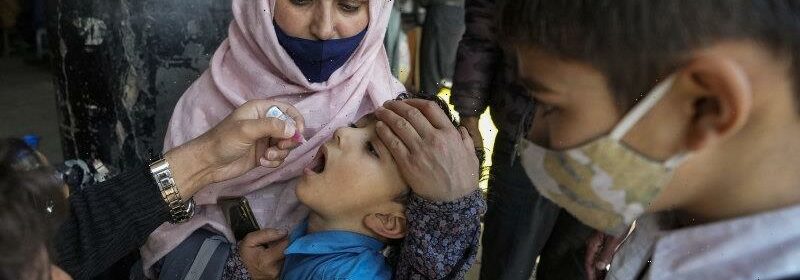Lives at risk as 25 million children miss basic vaccinations amid pandemic

Geneva: About 25 million children have missed out on routine immunisations against life-threatening diseases, largely because the COVID-19 pandemic disrupted regular health services or triggered misinformation about vaccines, according to the UN.
A new report from the World Health Organisation and UNICEF said 25 million children last year failed to get vaccinated against diphtheria, tetanus and pertussis, a marker for childhood immunisation coverage, continuing a downward trend that began in 2019.
A medical volunteer administers a polio vaccine to a child at a bus station in Jammu, India.Credit:AP
“This is a red alert for child health,” said UNICEF executive director Catherine Russell.
“We are witnessing the largest sustained drop in childhood immunisation in a generation,” she said, adding that the consequences would be measured in lives lost.
Data showed the vast majority of the children who failed to get immunised were living in developing countries, namely Ethiopia, India, Indonesia, Nigeria and the Philippines. Vaccine coverage fell in every world region but the worst effects were seen in East Asia and the Pacific.
The number of “zero-dose” children, who did not receive any vaccinations, rose by 37 per cent between 2019 and 2021, from 13 million to 18 million children mostly in low- and middle-income countries, the data showed.
“Whether we act on the basis of ethics or enlightened self-interest, we must put [children] top of our list of priorities.”
For many diseases, more than 90 per cent of children need to be vaccinated to prevent outbreaks. There have already been reports of rising cases of vaccine-preventable diseases in recent months, including a 400 per cent rise in measles cases in Africa in 2022.
Experts said this “historic backsliding” in vaccination coverage was especially disturbing since it was occurring as rates of severe malnutrition were rising. Malnourished children typically have weaker immune systems and infections like measles can often prove fatal to them.
“The convergence of a hunger crisis with a growing immunisation gap threatens to create the conditions for a child survival crisis,” the UN said.
Scientists said low vaccine coverage rates had already resulted in preventable outbreaks of diseases like measles and polio. In March 2020, WHO and partners asked countries to suspend their polio eradication efforts amid the accelerating COVID-19 pandemic. There have since been dozens of polio epidemics in more than 30 countries.
In 2021, 24.7 million children missed their first dose of measles vaccine, and a further 14.7 million did not get the essential second dose, the data showed. Coverage was 81 per cent, the lowest since 2008.
“This is particularly tragic as tremendous progress was made in the two decades before the COVID pandemic to improve childhood vaccination rates globally,” said Helen Bedford, a professor of children’s health at University College London, who was not connected to the UN report.
She said the news was shocking but not surprising, noting that immunisation services are frequently an “early casualty” of major social or economic disasters.
David Elliman, a consultant pediatrician at Britain’s Great Ormond Street Hospital for Children, said it was critical to reverse the declining vaccination trend among children.
“The effects of what happens in one part of the world can ripple out to affect the whole globe,” he said, noting the rapid spread of COVID-19 and more recently, monkeypox.
“Whether we act on the basis of ethics or enlightened self-interest, we must put [children] top of our list of priorities.”
AP, Reuters
Most Viewed in World
From our partners
Source: Read Full Article
